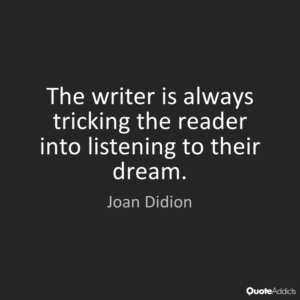I’ve been doing readings from my award-winning fiction since the early 90s and one of the common questions I get afterwards is “Do your characters ever tell you what to do?” or “Do your characters ever get away from you?”
That question is a fascinating doorway into how people tend to perceive authors and the writing process–and how they want to.
My answer is plain: Never. And here’s what I mean. Everything that appears in my books, every aspect of plot, setting, dialogue, characterization, action is mine. Hell, the punctuation is mine, or as much mine as anything can be in this life of transience. I created it all, and even if I got advice from an editor or was inspired by other writers, the final form is mine. The words are mine, the rhythms are mine. It’s all shaped by me as a writer, as an artist, consciously and unconsciously.
My characters are not independent of who I am. They don’t speak to me: I speak through them.
 Saying a character surprised me is dramatic, but it’s not accurate. I surprised myself. Something was churning away inside, some unexpected connection got made that changed what I was working on. This happens constantly when we write: a mix of editing and revision and creation at the sentence level and the chapter level.
Saying a character surprised me is dramatic, but it’s not accurate. I surprised myself. Something was churning away inside, some unexpected connection got made that changed what I was working on. This happens constantly when we write: a mix of editing and revision and creation at the sentence level and the chapter level.
But many writers love to grin and say, “Yes” in answer to the question above, and then they tell dramatic stories that make audiences smile and even laugh. It seems to confirm something to non-writers about what it’s like to write; it makes the whole experience more romantic and glamorous than it actually is. And casts authors as at least mildly eccentric, and not entirely in control of themselves or their work when the truth is completely different.
Once I was nearing the end of a book and realized I had the wrong person committing murder. It wasn’t the murderer speaking to me, or the victim piping up, or even the gun giving me advice. It was the mind of a writer spinning straw into gold. And after a long and fruitful career, I’m glad those moments keep coming.
Lev Raphael is the author of a guide to the writing life, Writer’s Block is Bunk, and 24 other books in genres from memoir to mystery.




